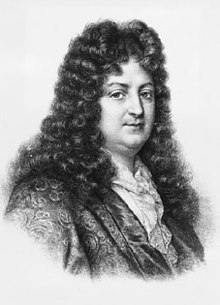Jean Racine
French dramatist (1639–1699)
Jean Racine (December 22, 1639 – April 21, 1699) was a French dramatist, one of the "big three" of 17th century France (along with Molière and Pierre Corneille). Racine was primarily a tragedian, though he did write one comedy.

Quotes
editAndromaque (1667)
edit- Je l'ai trop aimé pour ne le point haïr!
- I loved him too much not to hate him at all!
- Hermione, act II, scene I.
- I loved him too much not to hate him at all!
Britannicus (1669)
edit- Derrière un voile, invisible et présente,
J'étais de ce grand corps l'âme toute-puissante.- Behind a veil, unseen yet present,
I was the forceful soul that moved this mighty body.- Agrippine, Britannicus, (1669), act I, scene I.
- Behind a veil, unseen yet present,
Les Plaideurs (1669)
edit- Ce que je sais le mieux, c'est mon commencement.
- What I know best is the beginning (of my speech).
- Petit Jean, the porter, Act III, scene III.
- Classical and Foreign Quotations, 3rd ed. (1904), no. 274
- What I know best is the beginning (of my speech).
- Vous êtes empereur, Seigneur, et vous pleurez!
- You are Emperor, my lord, and yet you weep?
- Bérénice, act IV, scene V.
- You are Emperor, my lord, and yet you weep?
- Mon unique espérance est dans mon désespoir.
- My only hope lies in my despair.
- Atalide, act I, scene IV.
- My only hope lies in my despair.
Mithridate (1673)
edit- Jamais on ne vaincra les Romains que dans Rome.
- Never will the Romans be conquered but in Rome.
- Mithridates, act III, scene I.
- Classical and Foreign Quotations, 3rd ed. (1904), no. 1160
- Never will the Romans be conquered but in Rome.
- Un bienfait reproché tient toujours lieu d’offense.
- To reproach a man with favours conferred is tantamount to an affront.
- Agamemnon, act IV, scene VI.
- Classical and Foreign Quotations, 3rd ed. (1904), no. 220
- To reproach a man with favours conferred is tantamount to an affront.
Phèdre (1677)
edit- Tout m'afflige et me nuit, et conspire à me nuire.
- All afflicts and injures me, and conspires to my injury.
- Phèdre, act I, scene III.
- All afflicts and injures me, and conspires to my injury.
- Ariane, ma sœur, de quel amour blessée,
Vous mourûtes aux bords où vous fûtes laissée.- Ariane, my sister, wounded by what love,
You died on the shores where you were abandoned.- Phèdre, act I, scene III.
- Ariane, my sister, wounded by what love,
- C'est toi qui l'as nommé.
- You have named him, not I.
- Phèdre, act I, scene III.
- You have named him, not I.
- Ce n'est plus une ardeur dans mes veines cachée:
C'est Vénus tout entière à sa proie attachée.- It is no longer a passion hidden in my heart:
It is Venus herself fastened to her prey.- Phèdre, act I, scene III.
- It is no longer a passion hidden in my heart:
- L'innocence enfin n'a rien à redouter.
- Innocence has nothing to dread.
- Hippolyte, act III, scene VI.
- Innocence has nothing to dread.
- Ainsi que la vertu, le crime a ses dégrés;
Et jamais on n'a vu la timide innocence
Passer subitement à l'extrême licence.- Crime, like virtue, has its degrees;
And timid innocence was never known
To blossom suddenly into extreme license.- Hippolyte, act IV, scene II.
- Crime, like virtue, has its degrees;
Athalie (1691)
edit- Pour réparer des ans l'irréparable outrage.
- To repair the irreparable ravages of time.
- Athalie, act II, scene V.
- To repair the irreparable ravages of time.
- Aux petits des oiseaux il donne leur pâture,
Et sa bonté s’étend sur toute la nature.- For the hungry young nestlings His providence fends,
And over all nature His goodness extends.- Joas, act II, scene VII.
- The parody of the second line, Mais sa bonté s’arrête à la littérature, ("But His bounty draws the line at authors"), is ascribed to Léon Gozlan in Maxime du Camp’s Souvenirs Littéraires, i, 226. R. Alexandre, Musée de la Conversation, 3rd ed. (1897), p. 353. W. F. H. King, Classical and Foreign Quotations, 3rd ed. (1904), no. 201
- For the hungry young nestlings His providence fends,
- Hâtons-nous aujourd'hui de jouir de la vie.
Qui sait si nous serons demain?- Today, let us make haste to enjoy life.
Who knows if we will be tomorrow?- Athalie, act II, scene IX.
- Today, let us make haste to enjoy life.
- Dieu des Juifs, tu l'emportes!
- God of the Jews, you prevail!
- Athalie, act V, scene VI.
- God of the Jews, you prevail!